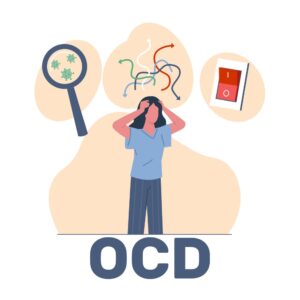OCD Diagnosis: A Comprehensive Guide
Obsessive-Compulsive Disorder (OCD) is a mental health condition characterized by persistent, intrusive thoughts (obsessions) and repetitive behaviors (compulsions). These behaviors are not just simple habits but are performed in response to distressing thoughts or urges, often leading to significant impairment in daily functioning.
An accurate diagnosis is crucial for effective treatment and management, as early detection can prevent the condition from worsening. For more information, visit Delhi Mind Clinic.
 The Diagnostic Criteria for OCD
The Diagnostic Criteria for OCD
The diagnosis of OCD typically follows the guidelines outlined in the Diagnostic and Statistical Manual of Mental Disorders (DSM-5), a standard reference used by mental health professionals worldwide. To be diagnosed with OCD, an individual must exhibit:
Obsessions: These are recurrent, persistent, and unwanted thoughts, urges, or images that cause significant anxiety or distress. Common obsessions include fears of contamination, causing harm to others, doubts about safety, or a need for symmetry.
Compulsions: These are repetitive behaviors (e.g., handwashing, checking) or mental acts (e.g., counting, praying) performed in response to an obsession. The purpose of these compulsions is to reduce anxiety or prevent a feared event. However, these actions are often excessive or not realistically connected to the feared outcome.
Time Consumption: The obsessions and compulsions must be time-consuming (taking more than an hour per day) or cause significant distress or impairment in social, occupational, or other important areas of functioning.
Exclusion of Other Disorders: The symptoms must not be due to the effects of a substance (e.g., drug abuse, medication) or another medical condition. Additionally, the symptoms should not be better explained by another mental disorder, such as generalized anxiety disorder or hoarding disorder.
The Diagnostic Process
Diagnosing OCD involves a comprehensive evaluation by a mental health professional, usually a psychiatrist or psychologist. The process often includes:
Clinical Interviews: The clinician will conduct detailed interviews to understand the nature, frequency, and impact of the obsessions and compulsions. This process includes exploring the patient’s history, including any previous mental health issues, family history of mental illness, and any significant life events that may have triggered or worsened the symptoms.
Psychometric Assessments: Standardized questionnaires and rating scales, such as the Yale-Brown Obsessive-Compulsive Scale (Y-BOCS), are commonly used to quantify the severity of symptoms and guide treatment planning. These tools help in assessing the degree of impairment caused by OCD and can track changes in symptoms over time.
Differential Diagnosis: It’s essential to rule out other conditions that may present with similar symptoms, such as Generalized Anxiety Disorder (GAD) or Body Dysmorphic Disorder (BDD). For example, while both OCD and BDD involve obsessions, BDD’s focus is specifically on perceived flaws in physical appearance, whereas OCD obsessions can be more varied.
Functional Impact Assessment: Beyond identifying symptoms, mental health professionals assess how OCD affects the patient’s daily life. This includes evaluating how the disorder impacts work, relationships, self-care, and overall quality of life. Understanding this impact is crucial in developing an effective treatment plan.
The Importance of Early Diagnosis
Early diagnosis and intervention are vital in managing OCD effectively. Without treatment, OCD can become chronic and debilitating, significantly impairing a person’s quality of life. OCD often leads to avoidance behaviors, social isolation, and difficulties at work or school.
Early detection allows for timely treatment, which may include Cognitive Behavioral Therapy (CBT), particularly Exposure and Response Prevention (ERP). For more information, visit the International OCD Foundation.
Living with an OCD Diagnosis
Receiving an OCD diagnosis can be overwhelming, but it is also the first step toward recovery. With appropriate treatment, many individuals with OCD can lead fulfilling lives. It’s important to seek support from mental health professionals, support groups, and loved ones.
Education about the disorder can also empower individuals to take an active role in their treatment. In addition, self-help strategies, such as mindfulness and stress management techniques, can complement professional treatment. For those seeking treatment, consider visiting:
Conclusion
Understanding the diagnosis of OCD is crucial for those who may be experiencing symptoms or know someone who is. By recognizing the signs and seeking help early, individuals with OCD can manage their condition and improve their overall well-being.
Effective diagnosis and treatment can lead to significant improvements, enabling individuals to regain control over their lives. This comprehensive approach to understanding OCD diagnosis underscores the importance of awareness, early intervention, and the value of professional guidance in managing this complex disorder.